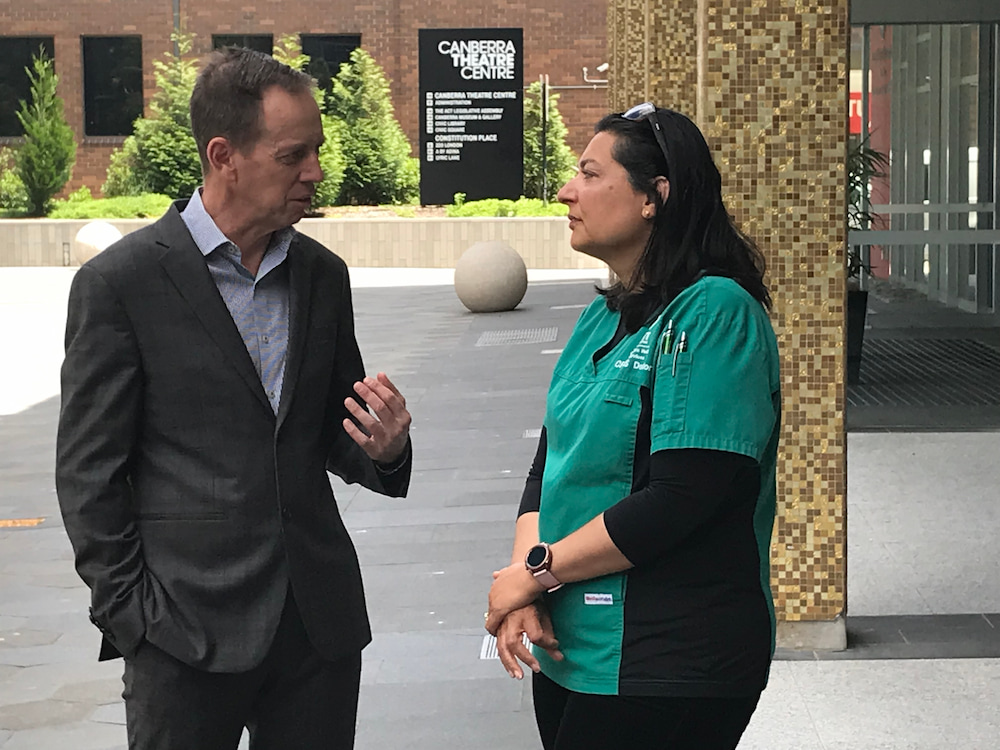The Australian government has set a target of zero road fatalities by 2035, and the ACT has also committed to Vision Zero: no deaths or serious injuries on the road network. But last year was the worst for road deaths in more than a decade.
Determined to make the ACT’s roads safer, ACT Attorney-General Shane Rattenbury on Wednesday convened a roundtable on dangerous driving. Participants – academics, road safety experts, the police, justice and community services, and politicians – discussed changing driver behaviour, reducing recidivist offending, and reducing the risk of deaths or injuries on roads. This will contribute to a new Road Safety Action Plan.
“There is no single easy answer,” Mr Rattenbury said. “We’ve got different cohorts of people who are responsible for dangerous activity on our roads, [from] people who drive every day who don’t drive as well, through to the quite serious ends involving criminal behaviour.”
Some young people drive dangerously because they seek thrill and adrenaline, Mr Rattenbury said, but they also want validation: “They often do things they think their friends will consider to be cool … Frighteningly, they put it on social media to impress their mates.”
Others underestimate their speed: 90 per cent of young drivers are not aware they are speeding, and do not believe any danger will happen to them, Dr Oleksandra Molloy, a behavioural scientist at UNSW Canberra, said. She believes they need feedback about their performance, and financial and safety implications.
Young people need education to understand the consequences of risk-taking behaviour, Mr Rattenbury said.
“They think they’re invincible. They think they can get away with it. They don’t have the experience to understand the risk parameters.”
The graduated licencing scheme (restrictions and sanctions gradually reduced over time as drivers become more experienced and skilled in operating a vehicle) is a good system, Dr Molloy believes.
“It can bring that time for them to gain more skills and knowledge and experience and really gain safe skills,” she said.
However, some offenders in their 30s and 40s continue to drive dangerously. Then there are criminals, who drive when their licences have been revoked, or who steal vehicles.
“Many of the rules that apply to an average rules-following citizen don’t apply to this cohort,” Mr Rattenbury said.
Reckless driving, including ramming police vehicles, has concerned police in the last couple of years. In response, ACT Policing last year launched Operation Toric to put repeat offenders behind bars and reduce motor vehicle theft.
“Clearly, some people will need to spend time in custody; the nature of their offences means they will need to go to jail,” Mr Rattenbury said. “But those people come out of jail again … What interventions can we put in place then, or while they’re in custody, that seek to change the behaviour, so they don’t just repeat the cycle and create danger on our roads?”
Older drivers face challenges in renewing licences due to age and resistance to stopping driving, Associate Professor Vanita Parekh AM, forensic pathologist, explained.
Medical conditions and prescribed medications might make someone an unsafe driver. Vision, reaction time, and the ability to split attention between different tasks – all affected by age – are critical to safe driving.
“A substantial proportion of people will not be receptive to being told that it’s time to think about stopping driving,” Professor Parekh said. “Often, it’s very difficult for families, for loved ones to be able to say maybe it’s time for you to stop driving. It needs to be given by someone more independent or referred through the Transport Authority.”
Hence the Fitness to Drive Medical Clinic, which assesses someone’s fitness to drive a motor vehicle.
Drugs and alcohol are contributing factors in motor vehicle fatalities, Professor Parekh said – and “a really preventable reason why people often have crashes”.
The ACT Government plans to change road transport penalties for driving under the influence of alcohol by the end of the year.
Canberra Daily is keen to hear from you about a story idea in the Canberra and surrounding region. Click here to submit a news tip.



